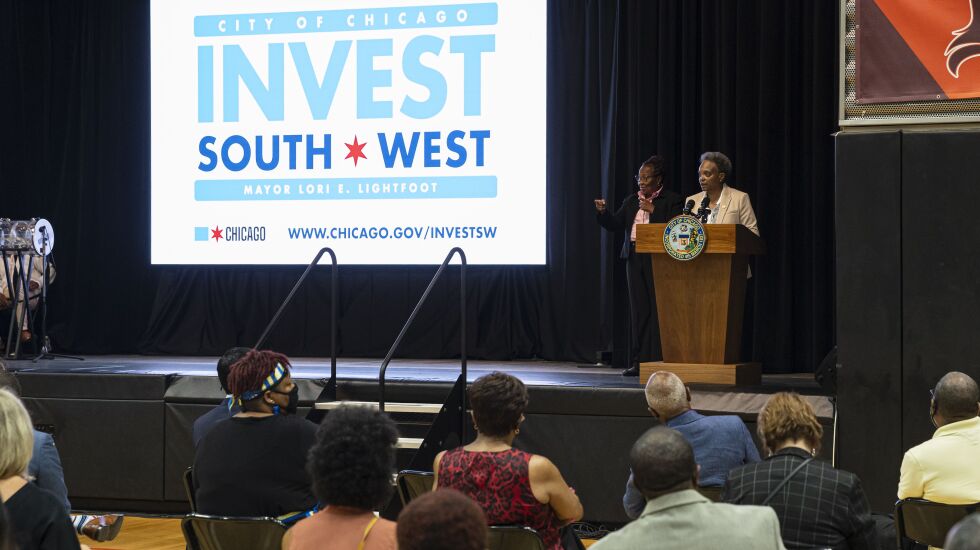
Former Chicago Mayor Lori Lightfoot’s signature development program INVEST South/West will be no more, at least in name, under Mayor Brandon Johnson’s administration.
While Johnson’s team is still evaluating the program, it may take “a very different path” toward investing in the South and West sides, one that won’t be dubbed INVEST South/West, according to Kenya Merritt, Johnson’s deputy mayor of business and neighborhood development,
“I think that there’s a perception of INVEST South/West, particularly with folks that live in neighborhoods, of an unfulfilled promise,” Merritt recently told WBEZ. “And that’s not what we want to continue to perpetuate in terms of the branding, or how we speak about investing on the South and the West side. And so because of that, we won’t be calling it INVEST South/West.”
Launched in 2019, INVEST South/West uses public dollars to attract private investment in order to revive commercial corridors in 10 target community areas. In those community areas, the program focuses on a major mixed-use development, as well as surrounding streetscape improvements, and grants to help surrounding small businesses.
The goal of INVEST South/West is to create “15-minute neighborhoods” where amenities are within walking distance for residents — a vision Merritt reiterated.
“We want our commercial corridors to be vibrant. We want people to have walkable communities. We want, no matter what your ZIP code is, no matter what neighborhood you’re in, for you to have access to good, reliable transportation,” Merritt said. “And so our goals are aligned, but we may have a very different path of getting there.”
Merritt would not say what exactly Johnson’s new approach will look like. When asked what needs to change about the program, Merritt said Johnson wants to see results.
“That’s one of the things that I am charged with. When we talk about outcomes, we want to see those outcomes in our neighborhoods,” Merritt said.
Merritt said the city counts 13 major development projects in INVEST South/West areas, four of which are under construction or will be soon, in Auburn Gresham, Englewood and Humboldt Park.
But officials are now evaluating what to do with the nine other projects — another in Humboldt Park, in Austin, Bronzeville, New City, North Lawndale, Greater Roseland, South Chicago and South Shore.
“When I say continue to evaluate, it doesn’t mean that we’re pulling funding from any of those projects,” she said. “What it means is that we’re assessing the feasibility. What you’ll see in many of the INVEST South/West projects [is] they are large-scale projects. And so what that may mean is, you know, maybe there’s a portion of an existing project that gets done. But, again … we have not yet made a decision on how we’re gonna proceed with the remainder.”
The INVEST South/West program is seen by many as an unprecedented strategy to invest in neighborhoods that have long been overlooked in favor of Chicago’s downtown area.
But it has also received some criticism for not moving fast enough to get cranes in the air.
In an interview with WBEZ, the commissioner who oversaw the program under Lightfoot, Maurice Cox, said “one of the biggest challenges is that sustained neighborhood investment doesn’t adhere to political cycles,” adding these projects can take five to seven years to “show themselves.”
Cox also acknowledged that the “very complex tax credit deals” used in large INVEST South/West projects “which inherently are difficult to deliver” perhaps slowed efforts to get “more cranes in the air earlier.”
It also remains unclear what exactly will change about the investment strategy. When pressed for details on pieces of a new approach, Merritt alluded to a change in how the city funds development projects on the South and West sides. Currently, INVEST South/West is funded through a mix of revenue sources, including tax increment financing.
“So we have a lot of tools in our toolkits in terms of the different funding levers that the city uses to invest in the built environment,” Merritt said. “And so we’re exploring to make sure that we have tools that are sustainable and that are equitable.”
Merritt acknowledged that development does not happen overnight, particularly in areas that have been ignored for decades, but she said any new approach will include community feedback and communication.
“Investment does take time in order to be realized,” Merritt said. “But I think that’s where the engagement and the communication with community is critically important.”
Mariah Woelfel covers Chicago politics and government for WBEZ.







